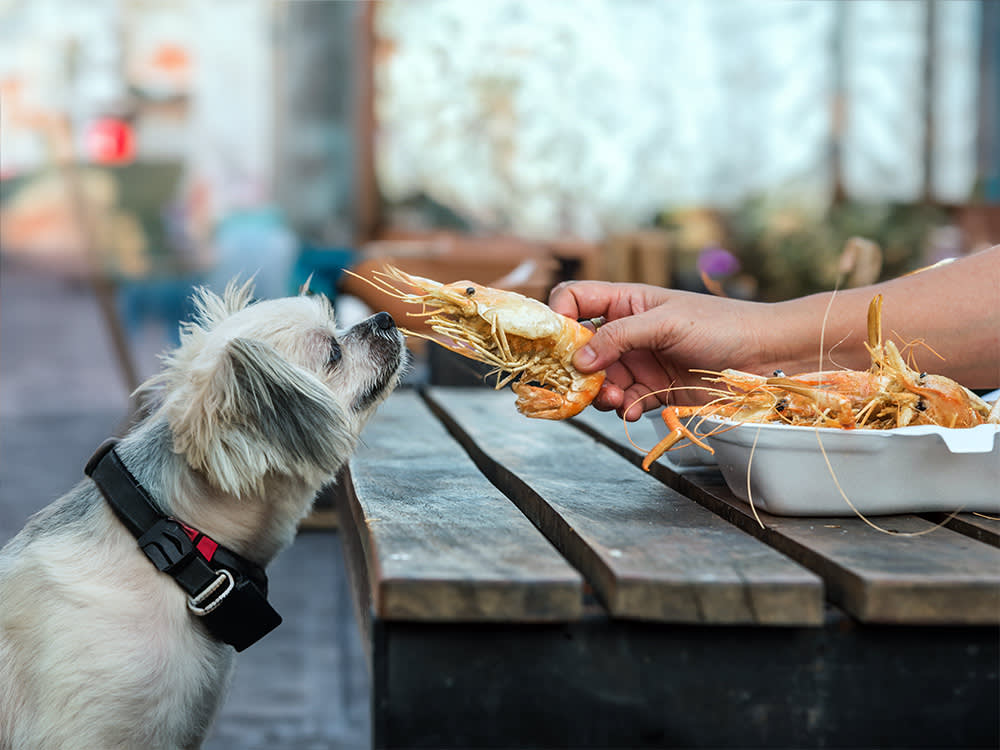Can Dogs Eat Shrimp?
Is your pup a seafood fan? Find out everything you need to know about feeding them shrimp.

Share Article
Dogs love savory snacks, and shrimp are no exception. Shrimp is a popular shellfish that many people enjoy. Like many flavorful foods, some pet parents get extra enjoyment out of sharing flavorful foods like shrimp with their dogs. That leads to the question: Is shrimp safe for dogs to eat?
Nutrition Facts: Shrimp for dogs
Shrimp is a low-calorie, high nutrient food that many people enjoy. Shrimp can be a nutritious treat for dogs, too, as long as it’s in moderation. Nutrition benefits of shrimp include:
Rich in omega 3 fatty acids: Essential fatty acids promote optimal cell function and can help the body absorb fat-soluble vitamins A, D, E, and K. Supplementation is thought to benefit some dogs with certain conditions including allergic skin disease, heart disease, and osteoarthritis.
Great source of iodine: Iodine is vital for thyroid function and brain development.
Contains antioxidants: Astaxanthin is the main antioxidant in shrimp and can help protect cells from being damaged by free radicals, which can lower the risk of chronic disease development.
High in protein: Protein is an essential nutrient that is vital to cell formation, growth, and function.
High in Vitamin B12: Vitamin B12 (cobalamin) is important for red blood cell formation and brain cell function.
Lots of potassium: Potassium is important for muscle function and helps the body maintain normal fluid levels.
Lots of phosphorus: Phosphorus is a vital mineral for the formation of bone and teeth.
Is shrimp good for dogs?
Shrimp can be a healthy special-occasion snack for many dogs. It’s packed with protein and contains numerous beneficial vitamins and minerals. Shrimp also has the advantage of being low in calories. While this tasty treat is low in calories, it is high in cholesterol. High cholesterol foods may not be appropriate for some dogs with sensitive gastrointestinal tracts or a high risk of developing pancreatitis.
Can dogs eat shrimp shells and tails?
Dogs should not be allowed to eat shrimp shells and tails. Pet parents should be sure to remove shrimp shells and tails before giving them to their dog. Shrimp shells and tails can become a choking hazard or irritate the esophagus on the way to the stomach. When discarding shrimp shells and tails, pet parents should be sure to keep them well out of their dog’s reach. Ingesting a large number of shrimp shells can lead to an intestinal obstruction.
Can dogs eat raw shrimp?
Dogs should not be fed raw shrimp. Raw shrimp may contain harmful bacteria or other pathogens that can cause food-borne illness like shellfish poisoning. Bacteria that may be found in raw shrimp include Salmonella, E. coli, and Vibrio. Symptoms of food-borne illness in dogs include vomiting, diarrhea, abdominal pain, anorexia, and lethargy.
Is shrimp completely safe for dogs?
Shrimp is non-toxic to dogs and generally considered safe in small amounts. Cooked shrimp is okay, but raw shrimp may have harmful bacteria. The high fat and cholesterol levels in shrimp may make it an unsuitable snack for some dogs.
Can dogs be allergic to shellfish like some people? Probably. The rate of shellfish allergy in dogs is unknown and the condition is not something that is commonly diagnosed. If your dog vomits once or develops loose stool after eating shrimp, they may have a food intolerance and should not be fed additional shrimp. Signs of true anaphylaxis in dogs include:
Hives
Redness
Facial swelling
Severe itching
Vomiting
Diarrhea
Breathing changes
Weakness
Collapse
If your dog shows signs of anaphylaxis after eating shrimp (or ever, really), you should get them to a veterinarian ASAP.
How to feed shrimp to a dog
Always cook shrimp before offering it to a dog. Never offer raw shrimp to avoid the risk of food-borne illness. When cooking, stick to boiled or grilled shrimp with no seasoning. Save the deep frying and Old Bay seasoning for the humans. Remove shrimp heads, tails, and shells. Cut the shrimp into fun, bite-sized pieces. Keep servings small — like one to two shrimp for a medium-sized dog — and feed sparingly.
The bottom line: Can dogs eat human food?
Dogs can eat human food, but only in moderation. Pet parents should provide the bulk of a dog’s nutrition with food that is specially formulated for canine health. Treats like shrimp should be fed in moderation. Human food and other snacks should make up 10 percent (or less) of a dog’s diet.
Other foods that are safe for dogs
Rice: Rice can be a great source of carbohydrates and fiber for dogs. White rice is easily digestible and can be used as part of a bland diet for dogs with diarrhea.
Chicken: Chicken is another great source of protein that dogs love. Like shrimp, chicken should be cooked and kept bland. Dog parents can prepare boiled or grilled chicken, leave out any seasonings, and remove all bones.
Eggs: Eggs are rich in protein and essential fatty acids. They have the added benefit of being easy to prepare and delicious. Dogs can be fed hard-boiled or scrambled eggs; just leave out any cheese, butter, seasonings, or other toppings.
Other food that are dangerous for dogs
Onions and garlic: Onions and garlic are both members of the Allium family and can cause hemolytic anemia in dogs. Onions and garlic should be avoided in all forms, including raw, cooked, and powdered.
Macadamia nuts: Macadamia nuts are toxic to dogs. They can be found raw, in baked goods, or in nut mixes. Symptoms of macadamia nut toxicity in dogs include vomiting, weakness, ataxia (wobbly gait), muscle tremors, and hyperthermia.
Xylitol: Okay, so xylitol isn’t exactly a food, but it is toxic to dogs and added to so many foods that pet parents should know to be on the lookout. Xylitol is an artificial sweetener that may be added to sugar-free gum/candy, peanut butter, baked goods, yogurt, and dental products (toothpaste and mouthwash). Xylitol toxicity in dogs can cause severe hypoglycemia (low blood sugar) and liver failure. Check ingredients labels before offering any human foods to your dog.
FAQs (People also ask)
Is shrimp toxic to dogs?
Shrimp is not toxic to dogs and can be fed to dogs safely in moderation. Before being fed to a dog, shrimp should be cooked fully and the shell and tails should be removed.
Can dogs eat raw shrimp?
Dogs should never be fed raw shrimp. Raw shrimp can contain harmful bacteria like Salmonella, E.Coli, and Vibrio that can cause food-borne illness. Symptoms of food-borne illness in dogs include vomiting, diarrhea, and abdominal pain.
References:

Dr. Alycia Washington, DVM, MS
Alycia Washington, DVM, is a small animal emergency veterinarian with over ten years of experience based in North Carolina. She works as a relief veterinarianopens in new tab and provides services to numerous emergency and specialty hospitals. She also works as a veterinary writer with a focus on educating pet owners, and is the author, under the name A. C. Washington, of the children’s book Dr. Jett, Monster Vet.
Related articles
![Golden retriever looks at some eggs on the counter]()
Can Dogs Eat Eggs and Eggshells?
Yes, eggs are a nutritious treat for dogs.
Can Dogs Eat Almonds (and Other Nuts)?
This healthy snack for humans isn't so healthy for your pup. Here's why it's best to avoid them.
Can Dogs Eat Kale?
Yep — this superfood is good for your dog in small amounts.
![Beagle puppy dog holding a peeled carrot in its front paws sitting in the grass]()
Can Dogs Eat Carrots?
Yep—this crunchy, sweet vegetable is a great addition to your dog’s diet.
![Ridgeback puppy eating an apple from a low-hanging tree]()
Can Dogs Eat Apples?
Here’s why this fiber-filled fruit is a healthy treat for your dog.
Can Dogs Eat Strawberries?
In moderation, strawberries are a tasty, healthy treat for your pup.









